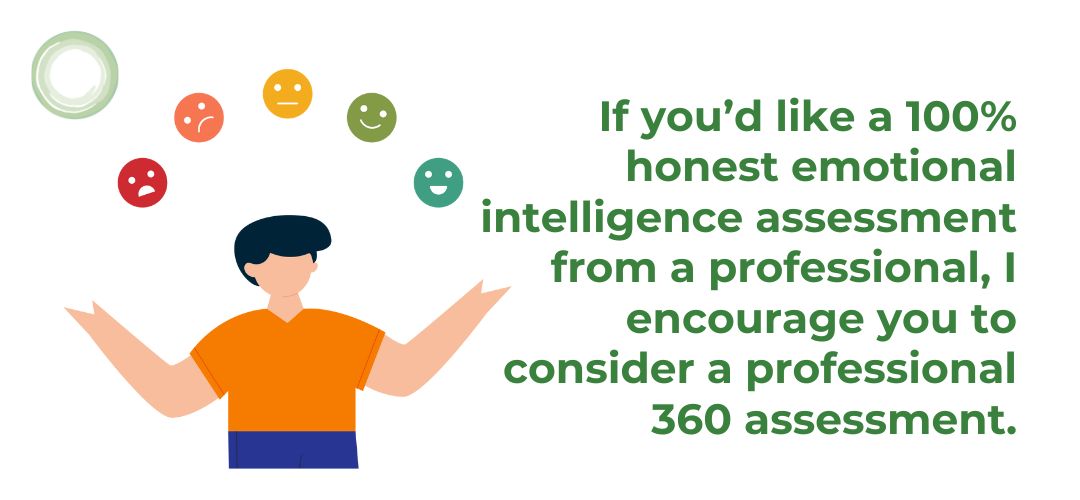First of all, I know what you’re thinking. “Susan, is it even possible to assess your own emotional intelligence? How am I going to convince my friends and coworkers to be really honest about my EQ?”
Is this the same as asking people how your pants look? Or what people really think about your fruitcake recipe?
Well, I’ve got good news and bad news.
The bad news is that when you do your own 360 Feedback (think: emotional intelligence assessment), you’re likely to get about 20% – 50% of the truth.
It’s extremely unlikely that your assistant is going to detail every single awkward thing that you do. Your friend probably isn’t going to give you the unvarnished truth about all of your annoying quirks.
But the good news is that just the fact that you’re interested in doing an emotional intelligence assessment shows that you have higher-than-average emotional intelligence.
And 20% – 50% honesty about your EQ is much better than nothing and much better than the nonexistent feedback you currently have! And even if your assessment isn’t perfect, it still opens the door to understanding why emotional intelligence matters in leadership.
Want to explore how your emotional intelligence impacts your leadership style? Our Enneagram Applied course offers tools to identify and shift emotional patterns that affect your communication and effectiveness.
If you’d like a 100% honest emotional intelligence assessment from a professional, I encourage you to consider a professional 360 assessment. The insights you’ll discover will create an opening to “up-level” your career and even your life.

But if you want to test the waters, how do you DIY an emotional intelligence assessment?
Curious how others perceive your leadership presence? While DIY is a good start, our EDGE assessment helps pinpoint blind spots and performance drivers you might be overlooking.
Share the following questions with 6 to 8 people — a mix of coworkers, clients, friends and family. Assure them that you want them to be honest and that you won’t be mad if they share less-than-totally-positive responses with you.
In fact, you would prefer that they list some things you could be working on. Share that you truly want to grow and the only way you can do that is to get feedback.
(And then don’t get triggered when they share less-than-totally-positive responses with you! Get curious and be receptive!)
10 Questions for a DYI 360 Assessment (to help build emotional intelligence)
1. What do you see as my primary strengths?
(Examples: patient, concise speaker, don’t engage in “office politics”)
2. Where do I most excel?
(Examples: client management, meeting deadlines, inspiring my team)
3. In your opinion, what strengths do I have that may not be fully leveraged?
(Example: you have great ideas for improving systems that nobody knows about, you’re extremely diplomatic and you’d be great on the management committee)
4. Where would you most like to see me develop?
(Example: you use a lot of “ums” and “ahs” that detract from your message, hiring a more diverse team)
5. What would you like to see more of?
(Example: morale-building with team, leaving at 5:00 pm)
6. What would you like to see less of?
(Example: meetings that last for more than an hour, nit-picking on issues that aren’t really that important)
7. How could I be even more effective?
(Example: delegate more, hire more senior-level people)
8. What do I not know that I don’t know? Where are my blind spots?
(Example: you could spend a little more time mentoring and developing others, making sure women and POC get equal speaking time and representation– see Intentional Diverse Sponsorship)
9. What would help our relationship be even better?
(Example: acknowledgment in front of my team, don’t dictate the process and instead focus on the outcome)
10. What don’t you know, but would like to know about me professionally or personally?
(Example: why you’re so passionate about our industry, what you do on the weekends)
Consider what you learned from these answers. Think about what you thought you knew about yourself and how others actually perceive you. How can you close the gap? That gap is your opportunity to build emotional intelligence.
Need help turning feedback into lasting behavior change? Our executive coaching programs turn insight into impact with personalized growth plans.
Now, imagine what would be possible with feedback that’s 100% honest and objective, where people provide anonymous, structured feedback. Our clients say this assessment has been a key inflection point in their career.
Here’s the truth: your clients and employees have opinions and feelings about the way you lead, whether you choose to become aware of them or not. You can’t work on what you’re blind to and choosing not to know doesn’t benefit you personally or professionally.
The most successful leaders I know are the leaders who live in a growth mindset. Are you that kind of leader? If you’re interested in learning about how a 360 process can change your life, we’d love to help. Contact us to learn more.


